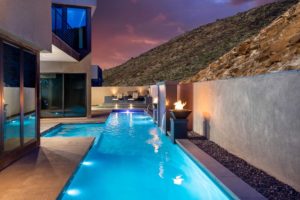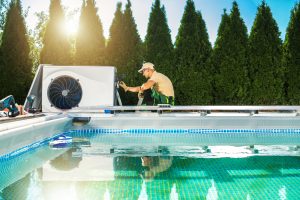Residential License # 890459
Commercial License # 3667

Talk to an Expert
Residential License # 890459
Commercial License # 3667

Talk to an Expert
Swimming is enjoyable in any season, thanks to a heated pool that offers year-round comfort. A heated pool enhances a home’s outdoor space for leisure, exercise, or boosting property value. Making an informed decision before installing one requires considering energy efficiency, maintenance needs, and heating alternatives. TurnKey Pool Designers has the expertise to create and construct heated pools that fit a range of spending limits, climates, and lifestyles.

A heated pool offers extended swim seasons and added comfort. Warm water makes swimming a great way to stay active, connect with friends, or unwind. Beyond personal use, it enhances a property’s appeal and overall aesthetic.
A hot tub brings swimming far into autumn, allowing more people to enjoy warmer evenings and increasing outdoor socializing. It also improves exterior space, further increasing a house’s appeal and the quality of pleasure for guests.
Throughout the year, use cold water to relieve aching joints. It also relieves pain in sore muscles. Cooler months are preferred for their warmth, unlike those without heated pools.
Warm pools encourage circulation, relax aching muscles, and ease stress. They’re perfect for low-impact exercise, wellness, and recovery support, and for those with joint or mobility impairment.
A hot tub makes a home more desirable, making the home more marketable in oversaturated real estate markets. It also enhances the beauty of the outdoor space, which draws other potential buyers seeking luxury features.
Choosing a heating system depends on energy efficiency, cost, and climate. Options include solar, gas, heat pumps, and electric resistance heaters, all having their pros and cons. The best option is one that aligns expenses with usage needs.
Solar heaters employ panels to heat water in the pool with sunlight. They are more expensive but have minimal costs of operation; hence, they are best for hot regions. A solar cover helps retain heat for better efficiency.
Gas heaters work well for heating quickly and thus are convenient to use from time to time or in colder zones. They provide quick heating faster than other setups, but are associated with greater fuel expenses. They will require regular maintenance to work at their best.
Since they take heat out of the air and pass it to hot water once again, heat pumps are extremely efficient in warm, temperate weather. They pay for themselves back in the long run, although they may be pricier to purchase initially.
These warmers are best for small pools or hot tubs. They heat using electrical currents. Although they cost less to purchase, they consume more power and, therefore, cost more to run in areas where electricity is costly.
Costs are saved, and efficiency is optimized with a well-planned installation. A few considerations should be made to reap the best returns.
Larger pools need more energy to heat, so accurate calculations matter. Wind, shade, and elevation affect heat retention, and insulated covers help reduce heat loss. Custom heating may be needed for non-standard pool shapes.
Climate influences heating options. Warmer climates can use solar or heat pumps, whereas colder climates can use gas heaters. Regular swimmers appreciate energy-efficient solutions, whereas occasional users might prioritize lower initial costs.
Most locations need permits to install heating systems. Compliance with safety standards, including proper grounding and ventilation, avoids future problems. Reviewing local regulations before installation ensures a smooth experience.
Installation costs depend on the heating system. Gas heaters cost less upfront, while solar and heat pumps require more investment but save more over time. Monthly expenses vary with energy rates, with heat pumps and solar being the most efficient.

Regular upkeep guarantees effective functioning and an extended lifespan for heated pools. Maintaining cleaned filters, appropriately balanced water, and conducting regular inspections prevents expensive repairs. Winterization in the cold seasons protects equipment and helps save your investment.
The filters require regular cleaning to avoid clogging, which becomes a strain on the heating system. Heat exchangers require checking for mineral deposits, especially in regions where water is hard. Check often to identify small issues before they turn into costly repairs.
Correct pH and chlorine levels to avoid corrosion. Normal testing, particularly after thunderstorms, keeps water chemistry in balance and safeguards equipment.
Solar heaters need annual maintenance from a qualified engineer to stay in good condition. Addressing minor issues early helps avoid costly repairs. With proper care, they can last up to 20 years.
In cold climates, winterizing avoids freezing damage. Draining water from the system, insulating pipes, and employing a hardy cover guard protect the investment in the off-season.
Boost energy efficiency and lower heating costs with simple steps. Add a pool cover, adjust heating habits, and use smart controls to conserve energy and stay cozy.
A good pool cover eliminates heat loss and evaporation, thus saving on heating bills. Having the pool covered at all times saves energy and money on water treatment.
Programming heating schedules around peak usage minimizes energy waste. Heating only during needed times helps control costs while maintaining comfort.
Remotely controlled heating systems and smart thermostats are efficient and convenient. They help maintain temperature settings based on prevailing conditions, thereby conserving energy.
Warming a pool brings comfort but boosts energy consumption. Sustainable material and energy-efficient appliance selection reduces costs and harm to the environment.
Energy-efficient heating solutions such as heat pumps and solar water heaters save money. Tax credits assist with initial costs, and LED lighting enhances efficiency.
To save energy, cover the pool to avoid losing heat, align pump schedules, and minimize evaporation with windbreaks. Regular maintenance on the heater gives it a longer lifespan and avoids waste.
Solar panels and wind turbines put heating within reach and lower the dependency on nonrenewable energy. Staying current with green technology keeps things sustainable in the long run.
Safety comes first when adding a heated pool. Proper installation and maintenance prevent hazards and keep the environment secure.
Gas heaters need sufficient, clear airflow to prevent the accumulation of carbon monoxide. Routine inspections guarantee that vents stay unobstructed and clear of clutter.
Only licensed professionals should install electrical components. GFCIs protect against shocks, and wiring should be inspected regularly. Keep electrical devices away from water.
Automated systems help maintain a safe water temperature. Regular monitoring prevents overheating, especially for children and seniors.
A heated pool adds comfort, extends swim time, and boosts property value, but choosing the right heating system is essential for efficiency and cost. TurnKey Pool Designers offers expert guidance and professional installation to help homeowners make the best choice.
Let’s create a warm, energy-efficient pool together. Contact us today, and let’s find the ideal heating solution for your home!